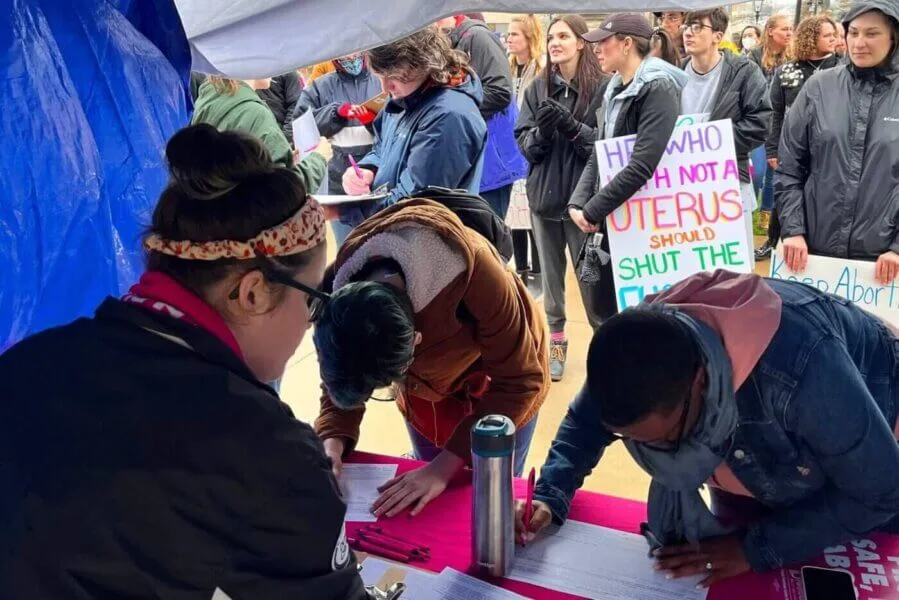
Planned Parenthood Advocates of Michigan collect signatures for the "Reproductive Freedom for All" ballot initiative at a protest after the draft Supreme Court opinion was leaked. (Source: PPAM Facebook)
MICHIGAN—The Board of State Canvassers rejected an abortion rights initiative that would’ve put a state constitutional amendment guaranteeing abortion access on the November ballot in Michigan.
Officials with the group behind the initiative—Reproductive Freedom for All—said they plan to appeal the decision to the Democratic-leaning Michigan Supreme Court, which would need to make a decision by at least Sept. 9 in order for the issue to head to the polls at the General Election on Nov. 8, 2022.
What Happened?
The Board of State Canvassers met on Wednesday to decide whether the initiative would be put on the November ballot—which would require at least three of the four members to vote in favor of the move.
The two Democrats on the board supported it. The two Republicans did not—creating a 2-2 deadlock. And since there’s no official state mechanism for breaking a deadlock, that counted as a rejection.
Opponents of the proposal have criticized typos in the amendment, where words are missing spaces.. More recently, opponents have also spok out against changes to the petition’s summary, which clarifies that the amendment would not immediately invalidate all other state laws that regulate abortion.
Tony Daunt, one of the Republicans, said the so-called errors in the petition’s language were “egregious.” Democrat Mary Ellen Gurewitz said the board had “no authority” to reject this petition.
What Happens Next?
The clock is ticking on the Sept. 9 deadline to finalize ballots ahead of the Nov. 8 General Election. If and when the Michigan Supreme Court receives the request for an appeal, it would need to move quickly—and make a decision before that date—in order for the measure to make it to the polls.
No hearings have been scheduled.
What is the Board of State Canvassers?
The Board of State Canvassers consists of two members from the political parties that earned the most votes in the last secretary of state election. In this case, it’s two Democrats and two Republicans. State parties provide a list of candidates to the governor, who appoints the members to four-year terms.
The board is largely described by Michigan courts as having administrative or clerical duties—mainly canvassing and certifying elections, conducting recounts and approving electronic voting systems. The board also reviews petitions to put initiatives on the ballot, as well as approves the exact language that voters will see on the ballot—which is where it comes into play with the Reproductive Rights Initiative.
Since the 2020 election, the board has become more political. After former President Donald Trump lost, he and his allies focused on Michigan’s Board of State Canvassers to try and challenge his loss.
Both Republicans who held the party’s seats in 2020 are gone. Aaron Van Langevelde, who voted to certify the results despite pressure from Trump supporters, was not nominated again by the state GOP when his term ended that winter. The board member who abstained from that vote in 2020, Norman Shinkle, resigned in June to run for a state legislative seat.
Gov. Gretchen Whitmer selected Tony Daunt from three nominees submitted by the GOP to replace Van Langevelde. Daunt, a longtime party activist, was an outspoken critic of Trump’s bid to challenge the 2020 results. Whitmer also appointed Richard Houskamp, another longtime activist who also said he doesn’t believe in the 2020 election conspiracies, to replace Shinkle.
One of the two Democrats who voted to certify the 2020 election results is still on the board: Jeannette Bradshaw, an electrician and elected leader within Detroit’s International Brotherhood of Electrical Workers. The other, Julie Matuzak, resigned in December 2020 after 10 years on the board. Mary Ellen Gurewitz, an attorney who represented Michigan Democrats before the board in 2020, was appointed to replace her.
The Associated Press contributed to this report.

VIDEO: Trump isn’t the only republican facing charges for alleged financial crimes
https://www.tiktok.com/@gandernewsroom/video/7361494909938978090 A whole lot of Michigan Republicans and lobbyists are facing criminal charges for...

VIDEO: It’s expensive to be poor in Michigan
https://www.tiktok.com/@gandernewsroom/video/7361154790300060974 Ever heard of predatory payday loans? Here’s how new laws could help protect...

Here’s everything you need to know about this month’s Mercury retrograde
Does everything in your life feel a little more chaotic than usual? Or do you feel like misunderstandings are cropping up more frequently than they...

The ’Gander wins multiple 2023 Michigan Press Association awards
MICHIGAN—The ’Gander Newsroom has earned multiple awards in the 2023 Michigan Press Association Better Newspaper Contest. The awards were announced...

Michigan Republicans ask Supreme Court to restrict medication abortion access
A lawsuit supported by Republicans could disrupt access to the most common form of abortion—even in Michigan, where reproductive rights are...






